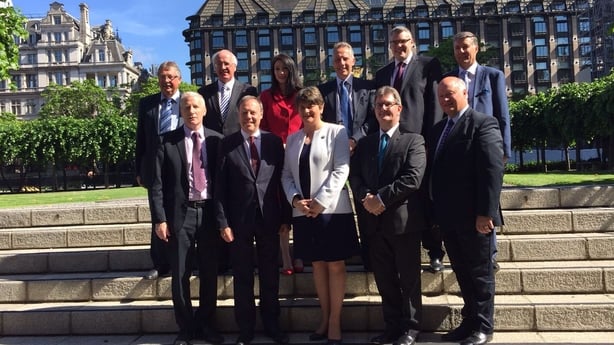British Prime Minister Theresa May has said the timetable for Brexit remains "on course" and talks would begin next week.
Speaking at a press conference in Paris with French President Emmanuel Macron, Mrs May said despite her ongoing negotiations to form a government "the timetable for the Brexit negotiations remains on course and will begin next week."
She also said: "We have been very clear we want to maintain a close relationship and a close partnership with the EU and individual member states into the future, including in the areas we've discussed this evening.
Mrs May also said that her party was "absolutely steadfast" in its commitment to the peace process in Northern Ireland.
Earlier today DUP leader Arlene Foster indicated a deal to support the Conservatives' minority government is close to being finalised.
Speaking after hours of talks between the two parties, the former First Minister said Brexit, counter-terrorism and "doing what's right" for the Northern Ireland economy were among the key issues being thrashed out.
Discussions in Westminster between the two parties have ended for the night but are to resume tomorrow.
Mrs Foster said: "We've had some very good discussions today and those discussions are continuing this afternoon.
"I hope that we can reach a conclusion sooner than later."
Mrs Foster, who arrived with deputy DUP leader Nigel Dodds, waved but did not say anything as she went into Downing Street earlier today.
She looked at her watch, ignoring a question from a reporter who asked: "What is your price?".
The DUP delegation is discussing the party's involvement in a potential confidence and supply arrangement in Downing Street following last week's UK General Election.

It is thought Mrs Foster, despite being a Brexit supporter, could seek assurances from the prime minister that she will pursue a softer exit from the EU, given Northern Ireland's 56% Remain vote and the DUP's desire not to see a return to a hard border with Ireland.
The DUP leader was almost certain to ask for greater investment in Northern Ireland as the price of a deal.
Mrs Foster has rejected suggestions that the mooted agreement could undermine a return to power-sharing at Stormont amid claims from political rivals that the government's stated impartiality as a mediator would be fatally undermined.
Last night, Mrs May told her backbench MPs that the DUP would not have a veto on the government's agenda, particularly in areas of social policy where the two parties disagree.
The prime minister also told the gathering that any deal would not affect talks aimed at restoring the power-sharing executive in Northern Ireland.
Mrs May's authority has been severely diminished after a disastrous general election which saw her lose her House of Commons majority.
While she appears to have seen off the threat of an immediate leadership challenge, her weakened grip on power has put her under pressure on several fronts.
Her new chief-of-staff, Gavin Barwell, has suggested she should take a different approach towards public spending after an anti-austerity Labour party election campaign denied her Conservatives a majority.
The prime minister also faced calls from Scottish Conservatives leader Ruth Davidson, whose influence has grown dramatically with the election of 13 Tories north of the border, to pursue a softer Brexit with greater focus on the economy and more cross-party input.
Fianna Fáil leader Micheál Martin has said a restoration of power-sharing in Northern Ireland is much more likely as a result of the UK General Election and he expected there to be an executive in place soon.
Speaking on RTÉ's Morning Ireland, Mr Martin said the enormity of Brexit demanded that the parties get together and work out a common position.
He said the body language from Sinn Féin was quite clear, that it wanted the executive back.
Mr Martin said he was much more hopeful now about a soft Brexit, following last week's election.
The presence of the DUP in a confidence and supply arrangement with the Conservative Party could mean a softer Brexit, he added.

